九年级英语Unit3Teenagers should be allowed to choose their own clothes
- 格式:doc
- 大小:290.50 KB
- 文档页数:6
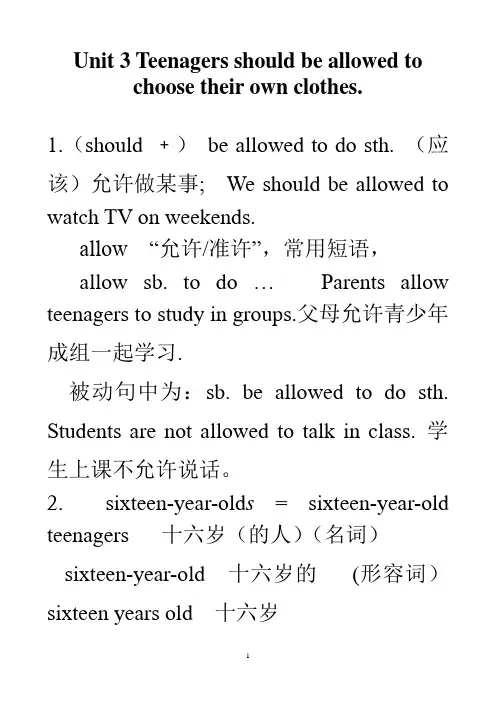
Unit 3 Teenagers should be allowed tochoose their own clothes.1.(should ﹢)be allowed to do sth. (应该)允许做某事; We should be allowed to watch TV on weekends.allow “允许/准许”,常用短语,allow sb. to do …Parents allow teenagers to study in groups.父母允许青少年成组一起学习.被动句中为:sb. be allowed to do sth. Students are not allowed to talk in class. 学生上课不允许说话。
2. sixteen-year-old s= sixteen-year-old teenagers 十六岁(的人)(名词)sixteen-year-old十六岁的(形容词)sixteen years old 十六岁The boy is five years old. = He is a five-year-old boy.3.o wn pron. & adj. 自己的I have my own bedroom.v. 拥有,占有This book is mine. I own it.owner n. 物主,主人Who is the owner of the house.4.(足)够…… enough +名词enough people/water/time/money形容词/副词+enough big/tall/serious enough5. stop to do…停下来去干……He stops to have a rest.stop doing… 停止(不准)干……Please stop talking.stop sb. from doing sth. 阻止某人做某事5. He doesn‟t seem to have many friends.= It seems that he doesn‟t have manyfriends. 他看起来没有很多朋友.6. He needs time to do homework. 他需要时间做作业. need (sth.) to do sth. They need money to buy food.need sth. We all need air and water.sth.doing sth. The bike needs repairing. = The bike needs to be repaired. (主动表被动)7. They talk instead of doing homework. = They don‟t do homework. They talk. 他们谈话,没有做作业.instead of +名词/代词They go to the movies instead of their parents.+动名词(doing) He sang a song instead of telling a story.8. a lot of =lots of 许(很)多/大量的(可/不可数名词)many(可数名词)much (不可数名词)9. So do we. 我们家也是(有). He runs so fast. So does his brother.1) 用副词too 多用于口语,句末, 肯定句/问句.either多用于口语,句末, 否定句表“……也一样”also 多用正式文体, 句中近动词, 各句型.2)用倒装陈述部分肯定用“so+谓动+ 主语”陈述部分否定用“nor/neither+谓动+主语”注意:so+主语+助动词/情态动词/系动词be”,表示赞同某人的看法,意为“是啊,确实如此”--- Lily sings well. --- So she does. ---Lily唱得好。
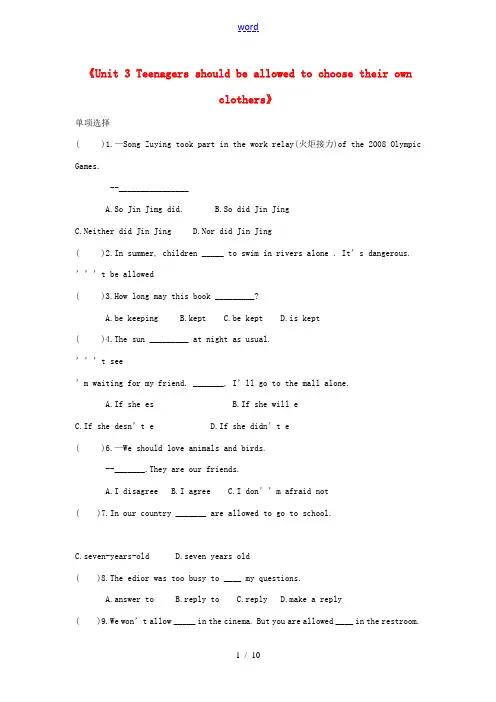
《Unit 3 Teenagers should be allowed to choose their ownclothers》单项选择( )1.—Song Zuying took part in the work relay(火炬接力)of the 2008 Olympic Games.--________________A.So Jin Jimg did.B.So did Jin JingC.Neither did Jin JingD.Nor did Jin Jing( )2.In summer, children _____ to swim in rivers alone . It’s dangerous. ’’’t be allowed( )3.How long may this book _________?A.be keepingB.keptC.be keptD.is kept( )4.The sun _________ at night as usual.’’’t see’m waiting for my friend. _______, I’ll go to the mall alone.A.If she esB.If she will eC.If she desn’t eD.If she didn’t e( )6.—We should love animals and birds.--_______.They are our friends.A.I disagreeB.I agreeC.I don’’m afraid not( )7.In our country _______ are allowed to go to school.C.seven-years-oldD.seven years old( )8.The edior was too busy to ____ my questions.A.answer toB.reply toC.replyD.make a reply( )9.We won’t allow _____ in the cinema. But you are allowed ____ in the restroom.A.smoke; smokingB.to smoke ; to smokeC.smoking; to smokeD.to smoke; smoking’t _____ too late, or you’ll feel tired in tomorrow’s classes.A.wake upB.stay upC.get upD.give up( )11.—I used to go out for a walk after supper.--_______________.A.So do IB.So did IC.So can ID.So am I.( )12.—What should we do first if we want to develop our village ?--A lot of new roads_____, I think.A.have to buildB.must buildC.must be builtD.have built( )13.I must get my breakfast ______ now.’t worry . He is _____ to look after little Betty.A.carefully enoughB.enough carefulC.careful enoughD.enough carefully( )15.What did you use to do ______ my age ?A.atB.inC.withD.to二.完形填空After the Second World War, there were many reports of mysterious(神秘的)“flying saucers(碟子)”.They 1 throughout the world.For quite a long time strange shapes had been reported in 2 parts of the world,but it was not until recent times that these were seriously studied . Pictures and films 3 of flying saucers, or UFOs seen in the sky . Some pilots of 4 reported that round flying machines had flollowd 5 , and moved at great speeds. Some unofficial (非官方的)experts and 6 suggested that some creatures(生物)from other planets were watching us. Some reports said a UFO had 7 the earth. A space creature 8 the UFO and moved around , then flew of again. But none of the landings was ever proved(被证实) to be true.What lies ahead of us (我们的前景如何)?We do not know. 9 we can be sure that whatever happens, we are living in an age which will grow streadily(稳定地) 10 .( )3.A.take B.took C.were taking D.were taken( )4.A.planes( )7.A.was B.left C.arrived nded on( )9.A.And B.But C.Or D.So( )10.A.interesting B.interested C.more interesting D.more interested 三.阅读理解A:Who Influences Teenagers?“Teenager” means people from 13 to 19 years old. Although they’re young, they have to make many important choices by themselves. They need to think about questions like these.Should I go to college ? What kind of jobs do I want ? However, other people also influence their choices . Who influences Teenagers ? Teenagers were asked this question and here’s what they said.It depends on the kind of choice . When teenagers buy things , friends are the most important influence. This is especially true for clothes and music. TV shows, advertiserments(广告)and parents also influence teenagers. In more serious things, parents are probably the most important influence. Some teenagers say it’s best to regard both parents and friends as influences. James, a seventeen-year-old boy says he’s “Just a crazy man”. He also says , “Parents are really important because they can tell you what’s right and wrong.”But teenagers also feel they need to make choices to make their own mistakes.As one teenage girl said, “If our parents don’t let us make our own choices, maybe in the future we won’t know how to do it .” And they feel friends can often be a big help, especially because friends sometimes know more about their situation(处境)than their parents do.Do you depend parents or others when you decide what to do and how to do it ? whoever(无论谁)you depend on ,the correct choice is the most important. Your future is in your hand.根据短文内容,判断正(T)误(F)( )1.When teenagers buy clothes and music, friends are the most important influence.( )2.People from 13 to 19 can be called “teenagers”.( ) shows and advertisements can’t influence teenagers.( )4.Sometimes friends know more about teenagers’situation than their parents.( )5.In more serious things , friends are probably the most important influence. BA DiscussionHost: Hello! I’m Gavin from All Talk 970FM.Wele to our program. Today our topic is part-time jobs. Are they good for school children or not?Headmaster(校长):Certainly not. Children have got two full-time jobs already: growing up and going to school. Part-time jobs make them so tired that they fall asleep in class.Mrs Smith: I agree. I know school hours are short, but there’s homework too. And children need a lot of stay at school until they’re eighteen or nineteen. A part-time job can’t harm(伤害)them. In fact, it’s good for them. They themselves make their pocket money . And they see something of the world outside school.Business man:You’re quite right. Boys learn a lot from a part-time job.And wemustn’t forget that some families need the extra(额外的)money. If the students don’t take part-time jobs , they can’t stay at school.Host: Well, we have got two for , and two agaist . What do our listeners think ? ( )1.How many guests join the discussion ?( )2.Who have the same idea ?A.Mr and Mrs Smith .B.The host and Mrs Smith.C.the headmaster and businessmanD.The businessman and Mr Smith( )3.Mrs Smith thinks that children ________.A.need enough sleepB.need the extra moneyC.should see something of the World outside schoolD.should stay at school until they’re eighteen or nineteen( )4.What do the children think of part-time jobs ?A.We are not told in this passageB.Part-time jobs are good for themC.Part-time jobs aren’t good for their studies.D.Part-time jobs can help the students from poor families.( )5.Where is the discussion most probably from ?A.A TV stationB.A radio stationC.A newspaperD.A magazzine.CStrong Man Swimming Club Rules1.All swimmers must take a shower before they go into the pool.2.Diving is only allowed from the diving-board.3.Running and playing near the pool is not allowed.4.Club members may bring guests at the weekends only.5.Children under 12 are not allowed to use the pool unless they are with an adult.6.Members must show their membership cards at the front reception desk.ed towels must be placed in the bins provided.8.Smoking is not allowed in the changing-room.9.Guests must sign at the front reception desk.10.Only club members and their families are allowed to use the pool.( )1.Diving is allowed from _____A.everywhereB.right side of the poolC.the diving-boardD.the gate ( )2.When are guests allowed to e ?A.FridayB.SaturdayC.Any dayD.After 6:00 pm.( )3.What must club members bring with them ?A.Towels.B.Keys.C.Swimming caps.D.Membership cards.( )4.If club members bring guests there, what should the guests do ?A.NothingB.Bring ID cardsC.Sing at the front desk( )5.Who are allowed to use the pool?A.AnyoneB.Onlyclub membersC.Only guestsD.Club members and their familiesDIn a classroom in any countries, the teacher teaches more than art or history language. He or she teachers something behind the culture(文化)of the country. In a country such as the United States, people with different histories, cultures and languages join together and they pay much attention to personal ideas. Teachers try to make each student special. Students do not have to remember a lot of information, instead, they work and find answers by themselves. There is often discussion in the classroom.At an early age students learn to have their own ideas. Their education encourages personal thought(思想).The important is placed on how to arrive at an answer and not only to get the correct answer.In most Asian countries, people have the same language, history and culture. Perhaps for this reason, the education there pays more attention to group goals than personal ideas. Children in China and Japan often work together and help each otheron homework. In the classroom, the ways of teaching are often very traditional. The teacher says , and the students listen. There is not much discussion. Instead, the students repeat(重复)rules or information that they have been taught in order to keep than in mind.In many ways there differences e from different educational ideas. In Western countries teachers are taught students to learn by themselves. In some Asian countries, however, teachers often feel that their job is to pass knowledge to students.回答问题1.Do students in the United States have to remember a lot of information ?2.There is often discussion in the classroom in America , isn’t there ?3.What does the education in the United States encourage ?4.Which does the education is some Asian countries pay more attention to , group goals or personal ideas ?5.Put the sentence “In some Asian countries, however, teachers often feel that their job is to pass knowledge to students.”into Chinese.四.词语运用。
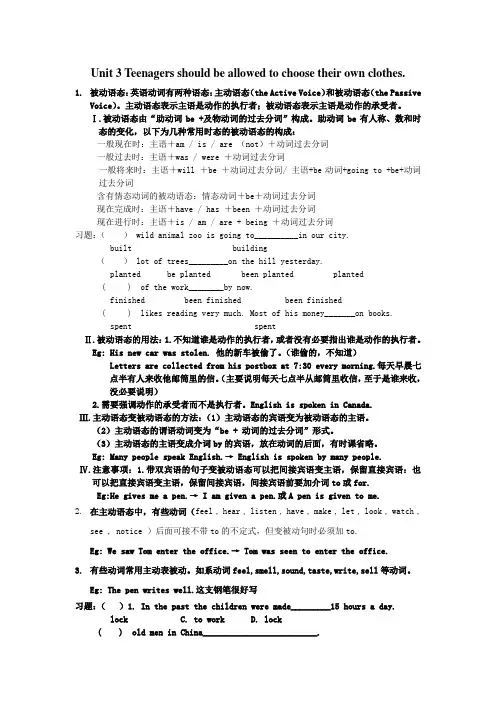
Unit 3 Teenagers should be allowed to choose their own clothes.1.被动语态:英语动词有两种语态:主动语态(the Active Voice)和被动语态(the PassiveVoice)。
主动语态表示主语是动作的执行者;被动语态表示主语是动作的承受者。
Ⅰ.被动语态由“助动词be +及物动词的过去分词”构成。
助动词be有人称、数和时态的变化,以下为几种常用时态的被动语态的构成:一般现在时:主语+am / is / are (not)+动词过去分词一般过去时:主语+was / were +动词过去分词一般将来时:主语+will +be +动词过去分词/ 主语+be动词+going to +be+动词过去分词含有情态动词的被动语态:情态动词+be+动词过去分词现在完成时:主语+have / has +been +动词过去分词现在进行时:主语+is / am / are + being +动词过去分词习题:() wild animal zoo is going to__________in our city.built building() lot of trees_________on the hill yesterday.planted be planted been planted planted( ) of the work________by now.finished been finished been finished( ) likes reading very much. Most of his money_______on books.spent spentⅡ.被动语态的用法:1.不知道谁是动作的执行者,或者没有必要指出谁是动作的执行者。
Eg: His new car was stolen. 他的新车被偷了。
(谁偷的,不知道)Letters are collected from his postbox at 7:30 every morning.每天早晨七点半有人来收他邮筒里的信。
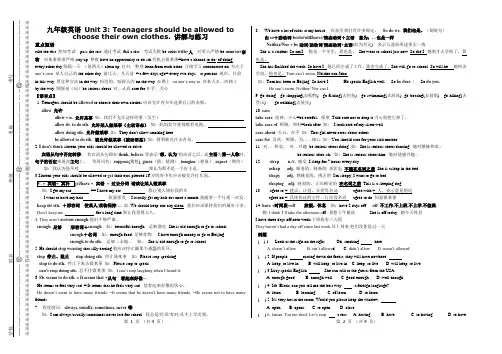
第 1 页 (共4 页) 第 2 页 (共4 页)学校 姓名 班级 考场 考号---------------------------------○密------------------ -------------------○封----------------------------- -- --○线----------------------------※※※※※※※※※※※※※※※答※※※※※※※※※※※※※※※※※※题※※※※※※※※※※※※※※※※线※※※※※※※※※※※※※九年级英语 Unit 3: Teenagers should be allowed tochoose their own clothes. 讲解与练习重点短语take the test 参加考试 pass the test 通过考试 fail a test 考试失败be strict with+人 对某人严格be strict in+事物 对某事要求严格stay up 熬夜have an opportunity to do sth.有机会做某事=have a chance to do/ of doing every other day 每隔一天 (每两天)clean up 打扫 整理learn from each other 互相学习concentrate on 专注于 one’s own 某人自己的the other day 前几天,几天前 = a few days ago= every two days at present 现在,目前 in this way 用这种方法in the way 挡道的,妨碍人的on the way 在路上 on one’s way to 在某人去…的路上 by the way 顺便说(问)be serious about 对…认真care for 在乎、关心 【语言点】1. Teenagers should be allowed to choose their own clothes.应该允许青少年选择自己的衣服。
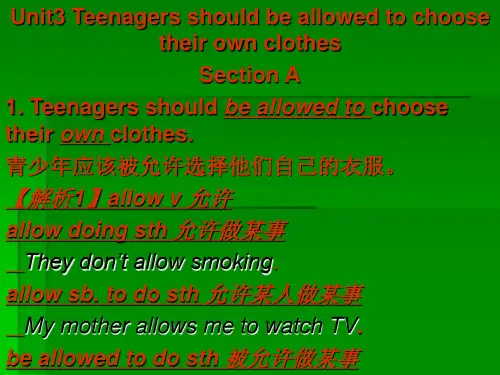
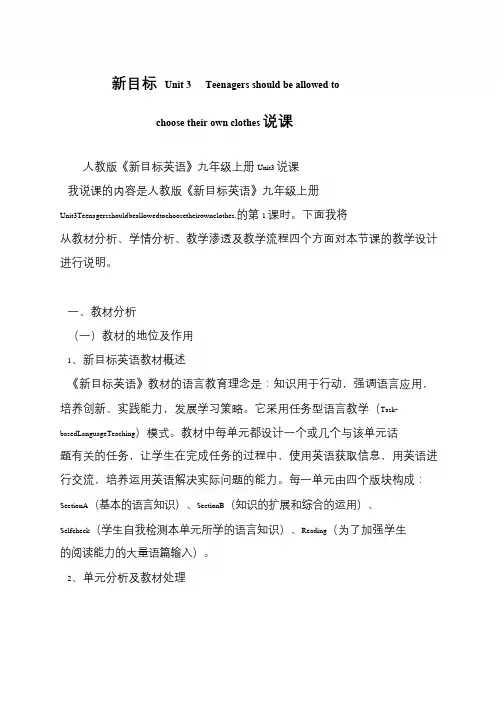
新目标Unit 3 Teenagers should be allowed to
choose their own clothes 说课
人教版《新目标英语》九年级上册Unit3 说课
我说课的内容是人教版《新目标英语》九年级上册
Unit3Teenagersshouldbeallowedtochoosetheirownclothes.的第1 课时。
下面我将从教材分析、学情分析、教学渗透及教学流程四个方面对本节课的教学设计
进行说明。
一、教材分析
(一)教材的地位及作用
1、新目标英语教材概述
《新目标英语》教材的语言教育理念是:知识用于行动,强调语言应用,
培养创新、实践能力,发展学习策略。
它采用任务型语言教学(Task- basedLanguageTeaching)模式。
教材中每单元都设计一个或几个与该单元话
题有关的任务,让学生在完成任务的过程中,使用英语获取信息,用英语进
行交流,培养运用英语解决实际问题的能力。
每一单元由四个版块构成:SectionA(基本的语言知识)、SectionB(知识的扩展和综合的运用)、Selfcheck(学生自我检测本单元所学的语言知识)、Reading(为了加强学生
的阅读能力的大量语篇输入)。
2、单元分析及教材处理。
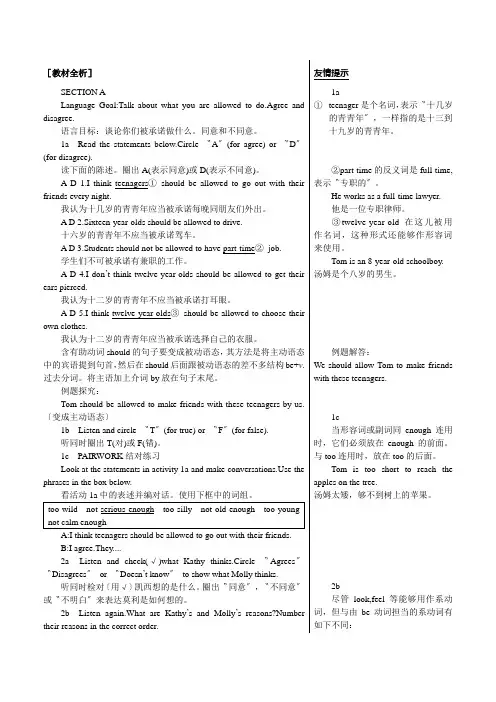
[教材全析]友情提示SECTION ALanguage Goal:Talk about what you are allowed to do.Agree and disagree.语言目标:谈论你们被承诺做什么。
同意和不同意。
1a Read the statements below.Circle 〝A〞(for agree) or 〝D〞(for disagree).读下面的陈述。
圈出A(表示同意)或D(表示不同意)。
A D 1.I think teenagers①should be allowed to go out with their friends every night.我认为十几岁的青青年应当被承诺每晚同朋友们外出。
A D 2.Sixteen-year-olds should be allowed to drive.十六岁的青青年不应当被承诺驾车。
A D 3.Students should not be allowed to have part-time②job.学生们不可被承诺有兼职的工作。
A D 4.I don’t think twelve-year-olds should be allowed to get their ears pierced.我认为十二岁的青青年不应当被承诺打耳眼。
A D 5.I think twelve-year-olds③should be allowed to choose their own clothes.我认为十二岁的青青年应当被承诺选择自己的衣服。
含有助动词should的句子要变成被动语态,其方法是将主动语态中的宾语提到句首,然后在should后面跟被动语态的差不多结构be+v.过去分词。
将主语加上介词by放在句子末尾。
例题探究:Tom should be allowed to make friends with these teenagers by us.〔变成主动语态〕1b Listen and circle 〝T〞(for true) or 〝F〞(for false).听同时圈出T(对)或F(错)。
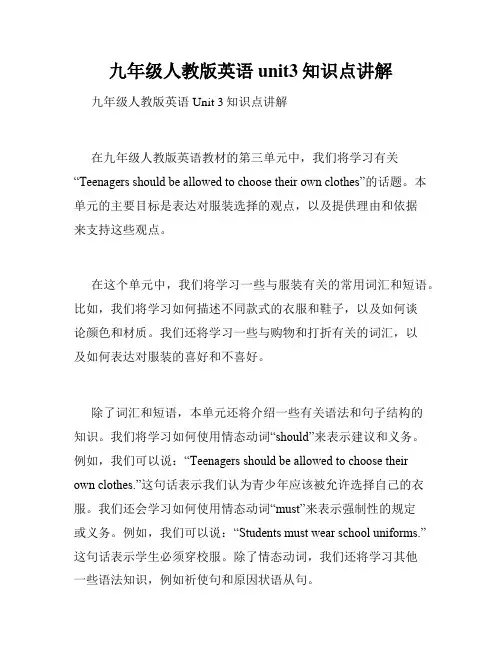
九年级人教版英语unit3知识点讲解九年级人教版英语Unit 3知识点讲解在九年级人教版英语教材的第三单元中,我们将学习有关“Teenagers should be allowed to choose their own clothes”的话题。
本单元的主要目标是表达对服装选择的观点,以及提供理由和依据来支持这些观点。
在这个单元中,我们将学习一些与服装有关的常用词汇和短语。
比如,我们将学习如何描述不同款式的衣服和鞋子,以及如何谈论颜色和材质。
我们还将学习一些与购物和打折有关的词汇,以及如何表达对服装的喜好和不喜好。
除了词汇和短语,本单元还将介绍一些有关语法和句子结构的知识。
我们将学习如何使用情态动词“should”来表示建议和义务。
例如,我们可以说:“Teenagers should be allowed to choose their own clothes.”这句话表示我们认为青少年应该被允许选择自己的衣服。
我们还会学习如何使用情态动词“must”来表示强制性的规定或义务。
例如,我们可以说:“Students must wear school uniforms.”这句话表示学生必须穿校服。
除了情态动词,我们还将学习其他一些语法知识,例如祈使句和原因状语从句。
在本单元中,我们也将学习如何进行听力和口语练习。
我们将听一些关于服装和购物的对话和短文,并回答一些与之相关的问题。
这将有助于提高我们的听力技巧和口语表达能力。
此外,我们还将进行一些角色扮演的练习,扮演不同的角色来表达对服装选择的观点。
学习这个话题不仅可以帮助我们扩展词汇和语法知识,还可以促进我们思考和表达个人观点的能力。
通过探讨服装选择的问题,我们可以思考为什么有些人喜欢流行的衣服,而另一些人喜欢传统的款式。
我们可以讨论服装与个人身份和社会观念之间的关系。
此外,我们还可以思考为什么学校有着对学生着装的规定,以及这些规定背后的原因。
总之,九年级人教版英语教材的第三单元提供了丰富的词汇、语法和口语练习,以及引发思考和讨论的话题。
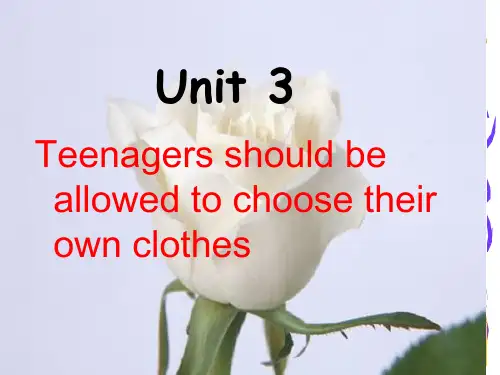
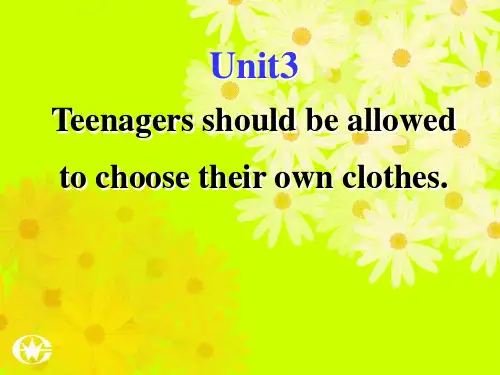
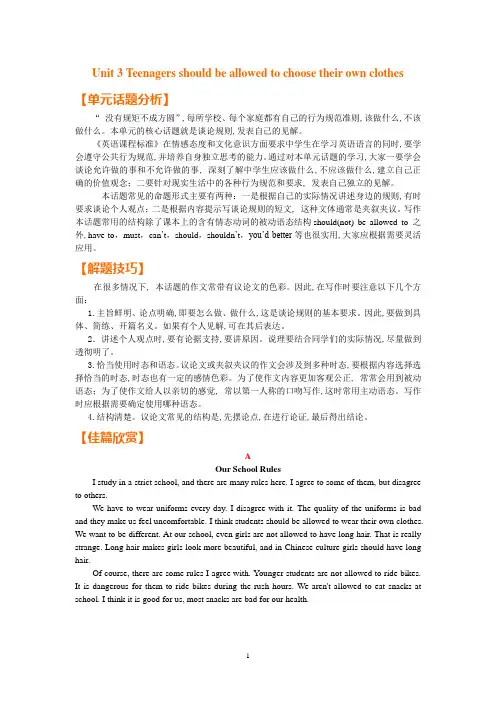
Unit 3 Teenagers should be allowed to choose their own clothes【单元话题分析】“没有规矩不成方圆”,每所学校、每个家庭都有自己的行为规范准则,该做什么,不该做什么。
本单元的核心话题就是谈论规则,发表自己的见解。
《英语课程标准》在情感态度和文化意识方面要求中学生在学习英语语言的同时,要学会遵守公共行为规范,并培养自身独立思考的能力。
通过对本单元话题的学习,大家一要学会谈论允许做的事和不允许做的事, 深刻了解中学生应该做什么,不应该做什么,建立自己正确的价值观念;二要针对现实生活中的各种行为规范和要求, 发表自己独立的见解。
本话题常见的命题形式主要有两种:一是根据自己的实际情况讲述身边的规则,有时要求谈论个人观点;二是根据内容提示写谈论规则的短文, 这种文体通常是夹叙夹议。
写作本话题常用的结构除了课本上的含有情态动词的被动语态结构should(not) be allowed to之外,have to,must,can’t,should,shouldn’t,you’d better等也很实用,大家应根据需要灵活应用。
【解题技巧】在很多情况下, 本话题的作文常带有议论文的色彩。
因此,在写作时要注意以下几个方面:1.主旨鲜明、论点明确,即要怎么做、做什么,这是谈论规则的基本要求。
因此,要做到具体、简练、开篇名义。
如果有个人见解,可在其后表达。
2.讲述个人观点时,要有论据支持,要讲原因。
说理要结合同学们的实际情况,尽量做到透彻明了。
3.恰当使用时态和语态。
议论文或夹叙夹议的作文会涉及到多种时态,要根据内容选择选择恰当的时态,时态也有一定的感情色彩。
为了使作文内容更加客观公正, 常常会用到被动语态;为了使作文给人以亲切的感觉, 常以第一人称的口吻写作,这时常用主动语态。
写作时应根据需要确定使用哪种语态。
4.结构清楚。
议论文常见的结构是,先摆论点,在进行论证,最后得出结论。
Unit3 Teenagers should be allowed to choose their own clothes.熟记以下短语:1. be all owed to d o sth 被允许干… allow sb to do sth 允许某人干…all ow doing sth 允许干…2. sixteen-year-olds = sixteen-year-ol d boys and girls 16岁的孩子3. part-time jobs 兼职工作4. a driver’s license驾照5. on weekends 在周末6. at that age 在那个年龄段7. on school nights 在上学期间的每个晚上8. stay up 熬夜9. clean up (相当与及物动词) 清扫10. fail (in) a test 考试不及格11. take the test 参加考试12. the other day 前几天13. all my classmates 我所有的同学14. concentrate on 全神贯注于15. be good for 对…有益16. in groups 成群的,按组的17. get noisy 吵闹(系表结构) 18. learn from 向某人学习19. at present 目前,现在20. have an opportunity to do sth 有做…的机会21.English-English dictionary 英英词典22. at l east 至少23.eight hours’ sl eep a night 每晚8小时的睡眠24. an ol d peopl e’s home 敬老院25. take time to do sth 花费时间干…26. primary schools 小学27. have…off 放假,休息28. reply to 回答,答复29. get in the way of 妨碍30. a professional athlete 职业运动员31. achieve one’s dreams 实现梦想32. think about 思考,考虑33. in the end 最后,终于34. be serious about 对…热忠/极感兴趣35. spend…on + n. spend …(in) + v-ing 在…上花费时间/金钱36. care about 关心,担心,在乎37. agree with 同意…固定搭配、词语辨析:1. Sixteen-year-olds shoul d be all owed to get their ears pierced.get their ears pierced 穿耳洞Sixteen-year-ol ds=sixteen-year-ol d teenagers让/使(别人)做某事get sth. d one (过去分词)have sth. done (过去分词)如:I get my car mended. = I have my car mended. 我让别人修好我的车写出下列句子同义句1.Sixteen-year-ol d teenagers can work at places like Target and Walmart.________ can work at places like Target and Walmart.2.Why not have your hair cut? Why not ______ your hair _____?2. They aren’t serious enough.enough 足够如:beautiful enough足够漂亮enough food 足够食物…去做…如:I have enough money to go to Beijing. 我有足够的钱去北京。
Unit 3 Teenagers should be allowed to choose their own clothes.Goals●To learn to use should ﹢be allowed to●To listen and speak about school lifeProceduresWarming up by learning new wordsTo start with, let’s first go to page 147 to go over the vocabulary for this unit. Read to the tape and try to learn off them by heart.Warming up by learning about “should ﹢be allowed to”We shall first learn to use the structures: “should ﹢be allowed to”. It is actually partAnimals should be allowed to live in the forest. Children should be allowed to watch TV at weekends.1a Reading and circlingFor practice of the “should ﹢be allowed to” r ead the statements in the box on page 18 and circle A for agree or D disagree.1b Listening and circlingListen and circle “T” for true or “F” for false beside the statements in the box on pageIn pairs look at the statements in activity 1a and makeconversation. You may use the phrases in the box on page 18A: I think teenagers should be allowed to go out with their friends.B: I agree. They are old enough.A: I think teenagers should be allowed to go to the mall with their classmates.A:I think teenagers should be allowed to get their driver’slicense.A: I think teenagers should be allowed to drive.A: I think teenagers should be allowed to get their ears pierced.A:I think teenagers should be allowed to watch TV at weekends.A: I think teenagers should be allowed to take the school bus.A: I think teenagers should be allowed to buy a new blouse at the mallA: I think teenagers should be allowed to choose their own clothes.B: I agree. They are old/ clever/ strong/ bright/ serious/ kind/ careful/ lucky/ enough. 2a Listening and checkingNext we are going to listen and check on page 19 what Kathy thinks. You may circleYou are going to listen again to the recording just now tonumber Kathy’s and Molly’s re asons in the correct order onpage 19.Next you are going to make in pairs a list of things teenagersshould and should not be allowed to do. Discuss your listwith your partner.A: Do you think teenagers should be allowed to drive?B: Yes, I think so.A: Do you think teenagers should be allowed to work late at night?B:No, I don’t think so. I don’t think they should be allowed to work late at night. They need to get enough sleep.A: Do you think teenagers should be allowed to disagree with their teachers?B: Yes, I think so.A: Do you think teenagers should be allowed to get tired doing their homework?B:No, I don’t think so.A: Do you think teenagers should be allowed to work every night?B: Yes, I think so.A: Do you think teenagers should be allowed to cut one’s hair?B: Yes, I think so. I kind of like my own style. It looks cool.A: Do you think teenagers should be allowed to have many friends?B:No, I don’t think so. They may meet bad people if they have too many friends. A: Do you think teenagers should be allowed to work on weekends?B: It depends on what they do. They may spend time with parents on weekends.3a Reading and writingYou are to read a dialogue between Sun Fei and Wu Yu on page 20.After reading you shall write in the chart Sun Fei’s and WuYu’s rules.Use “Don’t…” and “You can” to express your ideas.Jot down all the useful phrases form their dialogue.In pairs role play the conversation in 3a using the information in thechart on page 20.A: What rules do you have at home?B:Well, I’m not allowed to go out on school nights. How aboutyou?A:I’m not allowed to go out on school nights either. But I can watchTV with my sister.A: What rules do you have at school?B:Well, We’re not allowed to go out to movies on school nights. How about you?A:We’re not allowed to go out to movies on school nights either. But We can watch VCD with our teachers on the school playground.4 Doing groupworkTurn to page 20 and find someone in your group who has to g o home after school, who is allowed to stay up until 11:00 pm, who has to stay at home on school nights, who is allowed to watch TV every night, who had to clean up his room every morning.Write their names in the chart on page 20Closing down by reciting a kid poemAnother kid's poemThere is nothing under the bedOr on your closet floor,The monster is inside your headDon't worry anymore.It'll be there every nightIn your dreams to give you frightEvery time you turn off the lightAs long as you believe it.There is no monster on the stairsNor anywhere down the hallThis old house just settles at nightYou hear the creaks, that's allYou think you see a dragon peekThrough the window with a fang-ed beakAnd that's why you can't go to sleepAs long as you believe it.Mama loves you, daddy, tooAnd you will grow up tallNothing's going to happen to youWe'll take care of it all.You will be a fine young manA brave little boy who never ranWhatever you want to do, you canAs long as you believe it.So listen to me now, you poohIt's off to sleep right now with you.Daddy knows what you can doAs long as you believe it.SECTION BGoals●To read about rules of school●To talk about rules of schoolProceduresWarming up by talking about rulesHello, class. Are there any rules for us in this class? What are they? How were they made?Now list some of them and talk about them in pairs.1a Reading and checkingRead the questions on page 21 and write either “A” for always, “U” for usually, “S”In pairs you are to talk about your answers in activity 1a.I am going to play a dialogue to you. It is between a man and a boycalled Peter. They are talking about a math test. You are to listen andcircle the things in activity 1a you hear. While listening try to note theexpressions used.TapescriptListen again to the dialogue and match the sentence parts in the box onpage 21.Now copy down the expressions from the dialogue into your notebook.They are shown on the blackboard.2c Doing group workNext it’s reading time. Let’s read the article on page 22 and answer the questionsRole play a conversation using information from 3a.A:I think our school rules of always wearing school uniforms at school should be changed.B: Well, Mary and I talked about the rules the other day.A: At our school, we have to wear uniforms every day. That isbad for us.B: Yes, I agree. The problem is that all of us think the uniformsare ugly.A: I think young people should look smart and so we should beallowed to wear our own clothes.B: But our teachers believe that if we did that, we would concentrate more on our clothes than our studies.A: I disagree with them. We would feel more comfortable and that is good for studying. If we can't do that, we should be allowed to design our own uniforms. That would be a good way to keep both teachers and us happy.B:It’s also probably a good idea for parents to allow us to study in groups duringevening.A: I think so. I know we get noisy sometimes, but we learn a lot from each other.B: I also think that vacations should be longer.A:I agree with you on that. At present they're too short. Longervacations would give us time to do things like volunteering.B:Last summer I had an opportunity to volunteer at the localhospital, but I couldn’t because I had to go back to schools. It would be a good experience for me because I want to be a doctor when I'm older.A:Let’s go to talk to our teachers about the school rules after scho ol.B: OK! I agree with you!4 Making a list of rulesSuppose you and your friend are starting an English club. Make a list of rules aboutGet Up! Get Up!"Get up! Get up! Get out of bedyou lazy bum, you sleepyhead."Yes, that is what my mother saidat eight-oh-five today.She left the house and drove to work.She'll soon be feeling like a jerkwhen she finds out -- I have to smirk --Today is Saturday.--Kenn NesbittSELF CHECK1 Filling in blanksTo test your study this week you are to fill in each blank on page 23 with a correct word given. Change the form if it is necessary.2 Reading and writingYou are going to read the article on page 23 first and then write a letter to the editor agreeing or disagreeing. Explain your reasons.While you are reading cut the sentences into thought groups and underline the expressions.3. Helping and learningAt our school, we sometimes have a special day/ to help others. Last year/ we went to an old people’s home/ and sang songs/ and performed a play /for them. The old people were very happy. We should be allowed/ to take time/ to do things/ like that/ more often. For example, we should visit primary schools/ and help teach young students. I want to be a teacher/ when I'm older/ so it would be a great experience/ for me. Other students would like to do other jobs. For example, my friend Tian Ge wants/ to write for a newspaper. She should be allowed/ to volunteer/ at the newspaper office/ once a week. On Friday afternoons, many students are sleepy/ after a long week of classes. Some students should be allowed/ to have Friday afternoonsTo end this busy period we shall take time to learn and read aloud an English poem for kids.My FeetMy feet, my feet,I love my feet.I think they're great,I think they're neat.They're pretty, pink,and picturesque.They look so perfecton my desk.Unfortunately,sad to tell,they also havea funny smell.So though I'm fast,and though I'm fleet,and though at sportsI can't be beat,no team will pickme to compete,because they alwayssmell defeat.--Kenn NesbittReading: Should I be allowed to make my own decisions?Before you read, go over the new words for this part on 148.While you read, listen to the recording and underline all the expressions.Many teenagers have hobbies. But sometimes these hobbies can get in the way of schoolwork, and parents might worry about their child's success at school. Teenagers often think they should be allowed to practice their hobbies as much as they want. Do you agree?Liu Yu, a fifteen-year-old from Shandong, is a running star. He is in his school running team, and has always wanted to be a professional athlete. However, his parents won't allow him to train as much as he would like to. "Of course we want to see Liu Yu achieve his dreams,”says Mr Liu, “and we know how much he loves running. That's great, and my wife and I watched him in every one of his races. We have nothing against running! But we do think that our son needs to be realistic. Now he is getting older, he needs to think about what will happen if he doesn't become a professional runner in the end.”Liu Yu doesn't really agree. “Well, I think I should be allowed to make decisions formyself,”he says. “ My parents have always taught me the importance of working hard and not just to do what I enjoy. I understand this. But I'm serious about running. Being a professional runner is the only thing I have ever wanted to do.”Mr and Mrs Liu believe that Liu Yu should study hard in the evenings, and so they don't allow him to practice running on school nights. “I know this might seem strict,”says Mrs Liu, “but we think we're doing the right thing. He has to understand that very few people can become professional athletes. It's a very difficult dream to achieve. We don't allow him to practice every day because we think he needs to spend time on his homework.”But Liu Yu still doesn't agree. “I know my parents care about me,” he says. “But they are always talking about what will happen if I don't succeed. But I will succeed! I think I should be allowed to make this decision myself. Only then will I have a chance of achieving my dream.”After you read, read aloud the text again, to yourself, or to the tape and copy down all the expressions, too.Part 2: Teaching Resources(第二部分:教学资源)The Trouble with TeenagersPeople now care more about what teenagers are thinking about and feeling because they know there are hard moments in the life of teenagers.Varieties of troubles are seriously puzzling teenagers, such as hard study, the gap between parents and kids, relationship between themselves and their classmates, teachers and friends.Among them, the problem of "the generation gap" has become more and more obvious. The argument on this is widely spread. Different people hold different views. But we cannot fail to admit the fact that there are no hearts as delicate as those of teenagers, as everything is happening to them for the first time. Teenagers are certainly different from adults in many ways. They don't know the right way in which they can make everyone happy and satisfied. They are certainly lack of experience. That's why parents are always complaining about their being misunderstood. They say, they love their kids so much as to do everything for them. Is that the true love their children want? No, teenagers say, the true love which they long for should contain courage, correct guide and support instead of endless complaints about marks, marks, marks and strong pressure. So the teenagers are now even said to have been leading a harder life.The trouble with teenagers is that they haven't learned how to be controlled. Living life right down the middle, with all its attendant landmines, is all they know. It hasn't occurred to them to run in a zigzag pattern.They are more emotional than people think. If something serious happens to them, they will be deeply hurt. You can always hear the voice from a teenager that they haven't learned enough how to appear to be fine.The adults have recognized that they should show more care for the teenagers, especially their school life. Teenagers have their own special way of thinking.I have also got my own troubles. My grandpa passed away in September last year, which has greatly changed my life. He was even one of my best friends ever since I was born. He lived with my family for the past 18 years, the happiest time in his eyes.I have never admitted his death as a fact till now.Things which happened between us have come to my mind. All over again, I felt those powerful losses crisscrossing my own heart, and I know that when you say goodbye to a beloved grandparent, you say goodbye to something happy, something young in yourself. And that something never really returns and the pain never really goes away.No matter how hard a life the teenagers are leading, they will forever stand still and march forward straight and bravely.。
九年级英语Unit3Teenagers should be allowed to choose their own clothes.公开教学教案
教师:叶冬荣 2011年9月19号
Period 1 SectionA
第一课时
教学目标
1.初步掌握语言结构should (not) be allowed to do,学会表达agree和disagree。
2.对目标语言的听力训练,听取信息。
3. 教学重点:Talk about what you are allowed to do.
4 教学难点:Agree and disagree ,show your opinions.
教学过程
一、导入
1.利用课件中的图片进行下列活动
FAMILY RULES
1.Don’t talk loudly.
2.______________
3.______________
4.______________
5.______________
6.______________
1教师问学生通常在家里做什么?
让学生观察图片,选择哪些是在家不能做的,为什么。
2
(1)让学生以四人一组活动,各自谈论在家能做哪些,不能做哪些。
例如:go out at night, surf the Internet, play basketball, drive a car, have part-time jobs……
(2)让小组总结后填表:
(3)教师总结学生的表格,板书:
说明:通过学生感兴趣的内容引入新知。
二、Introduce the new structure:be allowed to
1.板书新结构“is allowed to”和“isn’t allowed to”来替换can do和can’t do。
说明:由熟悉的结构引入新的结构,有助于学生理解。
2.
板书:Nicky is allowed to play basketball at home.
Mary isn’t allowed to surf the Internet at home.
3.利用书本上的图片与课件中的内容讲授allow的语法知识。
4.让学生跟读句子,用导入中列举出表格中的活动进行操练,使学生熟练结构be allowed to。
三、教学SectionA-la.
1.强调重点词汇:teenager, choose, pierce。
2.让—位学生大声朗读 1a中的句子。
确定学生理解了每个句子之后,让学生发表自己
的看法:agree or disagree。
3.在学生掌握了结构be allowed to的基础上,进—步介绍带有主观态度的新结构:
should (not) be allowed to,告诉学生这—结构增加了情感态度,表示应该被允许和不应该被
允许。
(帮助学生理解la中的句子。
)
板书:should (not) be allowed to
4.学生完成 1a之后,让不同的学生发表意见: agree or disagree. Why?
四、教学SectionA-lb, 2a, 2b
1.利用学习指导中中学英语人教课标版9年级课后提高中的多媒体课件中的SectionA -1a,1b进行听力练习。
图表略(1)先帮助学生明确要求,并且给出—定的指导。
(2)让学生朗读其中的句子,问题。
说明:带着问题听录音能提高学生听的质量和信心。
(3)播放录音,核对答案。
2.利用学习指导中中学英语人教课标版9年级课后提高中的多媒体课件中的SectionA -2a,2b进行听力练习。
图表略(1)教师先帮助学生明确要求,并且给出—定的指导。
(2)让学生朗读其中的句子,问题。
(3)播放录音,核对答案。
五、教学巩固
1.学生列出青少年应该被允许做的和不应该被允许做的事情,列表之后进行free talk。
(1)要求学生重点结合SectionA -1c和SectionA -2c的内容进行小组活动,以便能更自然,更正确地使用所学的语言。
板书展示语言结构和交际中要用到的词组:
板书:结构:should be allowed to,should not be allowed to
词组:too wild,too silly,too young,not serious enough,not old enough,not calm enough
设计时充分创设贴近学生实际情况的情境,真实而富有趣味,激发学生的参与意识,巩固了本课的新知识。
六、作业 (Homework)
用结构 be (not) allowed to do列出课堂上没有介绍的—些事情。